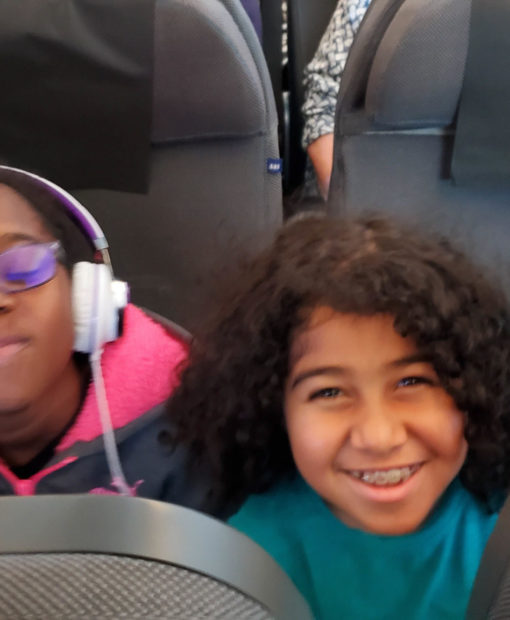Airplane Air Quality and Your Health
The Twin Doctors Travel Bag takes a look at in-cabin airplane air quality and what you need to know to stay healthy while traveling.

By Dr. Jamil Abdur-Rahman
The Twin Doctors Travel Bag
If you’ve ever wondered what you need to know about airplane air quality and your health, wonder no more. The quality of the air that we breathe in commercial airplane passenger cabins is very different than the quality of the air that we breathe almost anywhere else. For starters, airplane cabin air typically has 25% less oxygen than does non-cabin air. Additionally, airplane cabin air is typically 50% drier than non-cabin air; a measure taken to protect the integrity of the plane’s metal airframe from corrosion. And finally, half of the air in airplane passenger cabins is recycled or “recirculated” air. This recycled air, initially introduced into the cabin as fresh air, is then continually recirculated among the passengers over and over again for the entire duration of a flight. So how can the quality of airplane cabin air effect our health and what steps can we take to ensure that any effects are minimal?
Dry Air
When exposed to dry air, much of the water contained within our skin can be lost. Additionally, the layers of moisture that coat and naturally protect our eyes, noses, mouths and even our stomach linings can also become dry. When all of this water is lost we can begin to experience dry and itchy eyes, dry and itchy skin, dry and uncomfortable nostrils, a sore throat and an upset stomach. Additionally, when the natural protective barriers created by the moisture lining our eyes, noses and mouths is lost, we are at an increased risk for viral illnesses like cold and flu. There are however some things that we can do to protect ourselves from the dry in-cabin environment found on most airplanes:
1. Avoid drinking alcohol and caffeine while flying. Both have a “diuretic” effect which can cause or worsen dehydration.
2. Drink 8 ounces of water for every hour you are in flight.
3. Use saline nasal sprays and eye drops to replenish moisture.
4. Book yourself on fuller flights whenever possible. People in close proximity to one and other sweat. The more people there are on an airplane sweating, the more moisture there will be in that airplane’s cabin environment. The more moisture in the environment, the less dry the air will be.
5. Apply a thick layer of skin moisturizer that contains an animal fat based Omega-3 fatty acid like Krill oil. Omega-3 fatty acids not only prevent dehydration when applied to the skin, but they also prevent skin inflammation which can cause itching if that skin does dry a little bit.
Oxygen is everything to us. Every cell in our bodies use oxygen to function, and so exposure to even slightly lower than normal levels of in-cabin oxygen can have a profound effect on us. These effects can be magnified in passengers with previously undiagnosed or poorly controlled pre-existing medical conditions; leading sometimes even to life threatening in-flight medical emergencies. It is estimated that every year close to 100 people die on commercial airplanes in-flight. Many of these deaths result in part from the effect of diminished in-cabin oxygen on a passenger’s underlying medical condition(s). For the vast majority of healthy people however, exposure to diminished in-cabin oxygen does nothing more than to cause them to experience a slight headache, possibly to feel fatigued, and at worst to feel a slight bit winded. There are however some things that we can do to improve our overall oxygenation while flying:
1. Do more “belly breathing” and less “chest breathing”. Belly breathing utilizes your diaphragm forcing you to fill your entire lungs with air. Chest breathing just relies on your chest muscles and normally only fills the top lobes of the lungs.
2. Eat more raw fruits and vegetables prior to and during your flight. Raw fruit and vegetables contain lots of water and water of course contains oxygen.
3. Perform “Lymph Massage” during the flight. Lymph massage, by mobilizing oxygen containing lymphatic fluid from the lymph nodes into the general circulation can help to distribute oxygen throughout the body.
4. Yawn frequently. This increases the amount of oxygen in your lungs.
5. Sit straight up rather than reclining your seat. This makes it easier to “belly breath”
6. Take multivitamins rich in vitamins A, B5, B6, B12 and C in the days leading up to your flight.
7. Perhaps most importantly, if you have a medical condition affecting the nervous system, heart or lungs, consult with your Doctor before flying.
Recirculated Air
Approximately 50% of the air circulating in commercial airplane passenger cabins is fresh “bleed air”. Bleed air is air that is collected from outside of the airplane by the airplane’s engines. The bleed air is then rerouted from the engines (before it can mix with and become contaminated by fuel) and it is then introduced into the passenger cabin. The remaining 50% of the air circulating in the passenger cabin however is not fresh bleed air. Instead, it is recycled recirculated air that is passed through High Efficiency Particulate Air (HEPA) filters. These filters are designed to capture 99.97% of all particles between 0.1 to 0.3 micrometers. Because most airborne disease causing bacteria and viruses are larger than 0.1 to 0.3 micrometers, these HEPA filters effectively filter any disease causing bugs out of the recirculated cabin air each time that air is passed through them. These HEPA filters however do not protect you if disease causing bugs have just been emitted into the air around your seat before that air can be filtered. This can happen if someone is sneezing, coughing or vomiting close to you. There are however some things that you can do to protect yourself from unfiltered disease causing bugs in your personal airspace:
1. Wear a protective covering over your face. N95 Respirators rather than simple facemasks are preferred as these facial coverings can block 95% of disease causing bugs that are 0.3 micrometers in size or smaller.
2. If you do not wear a protective covering over your face then become a “nose breather” instead of a “mouth breather”. The nose can more effectively filter out disease causing bugs than the mouth can.
3. Do not position the flow of the air from your personal air flow nozzle directly at your face. Instead, direct the air flow away from your face and towards the floor where ventilation exhaust systems will then pull it away from you.
4. Boost your natural immunity in the days leading up to your flight with GI Probiotics, a 5,000mg “mega dose” of Vitamin C on the day of your flight, Ginkgo Biloba, Zinc and Garlic.
5. Get plenty of sleep before your flight and even if there are flight delays or cancellations DON’T get stressed. Stress and poor sleep can compromise your immune system.







 May 19, 2018
May 19, 2018 



 August 2, 2020
August 2, 2020 


